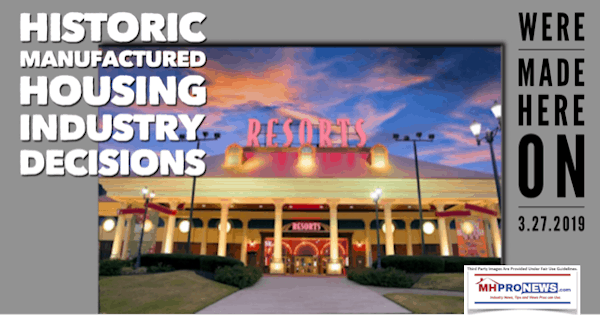
In a statement today to recapping what they are calling “Bold New Initiatives,” the Washington, D.C. based Manufactured Housing Association for Regulatory Reform (MHARR) is taking aim at issues to get to some underlying challenges facing manufactured housing going that arise from post-production scenarios.
MHARR and its members have kept these items under close wraps, as the Daily Business News on MHProNews learned about these core details through this release.
Here was the full MHARR statement today.

MHARR BOARD HOLDS HIGHLY PRODUCTIVE
MEETING — ADOPTS BOLD NEW INITIATIVES
Washington, D.C., April 2, 2019 – Despite producing its best homes ever, at a price point that is inherently affordable for virtually every American family, in a market environment featuring an ever-growing need for affordable homeownership and housing resources, the production and market-share of the federally-regulated manufactured housing industry continues to lag well behind not only the single-family housing market as a whole, but also the twenty and thirty-year historical production norms for the HUD Code industry itself. Confronting, as it does, a myriad of factors and challenges in the post-production arena that have combined to stunt the growth and expansion of the industry to levels far below what would otherwise be expected given an expanding population, job growth, and a prospering economy, the Manufactured Housing Association for Regulatory Reform (MHARR), at its March 27, 2019 Board of Directors meeting, adopted a bold plan of action to begin addressing key issues that the broader industry has failed to resolve, which have paralyzed the HUD Code market after the industry’s outstanding homes leave the factory. In addition, to lead this aggressive agenda, MHARR members elected an experienced slate of Association officers, to be led by John Bostick, President and CEO of Sunshine Homes, Inc., who will return as MHARR Chairman.
MHARR members, at their bi-annual Board of Directors meeting, identified, in particular, three post-production-related matters that, both short and long-term, have vexed the industry and American consumers of affordable housing, and the ability of the industry as a whole to fully serve the housing needs of vast numbers of Americans, contrary to both the letter of federal law and the will and intent of Congress, as set out quite plainly in both the Manufactured Housing Improvement Act of 2000 with regard to production and consumer protection, and the “Duty to Serve Underserved Markets” (DTS) provision of the Housing and Economic Recovery Act of 2008 (HERA) with regard to affordable and competitive consumer financing. These matters, which will now become the major focus of MHARR activity to take the lead within the industry to fully and completely implement both such existing laws, include:
(1) exclusionary/discriminatory zoning mandates;
(2) other placement restrictions or exclusions (principally affecting the development of manufactured housing communities); and
(3) the availability of consumer financing.
Discriminatory zoning – zoning restrictions or exclusions targeted at manufactured housing and manufactured housing consumers over large areas of the United States, and the failure of the broader industry to effectively fight and address those mandates – is a crucial aspect of the industry’s inability to expand and better serve the housing and homeownership needs of large numbers of Americans. To begin addressing this issue with the urgency that it deserves and warrants, MHARR will work cooperatively with state-level industry associations to target a sample set of localities with major and/or obvious discriminatory prohibitions against HUD Code manufactured homes, and, following appropriate fact-finding, will mount an aggressive campaign against those prohibitions, including litigation, if necessary, to the highest level that may be needed.
Similarly, in the related area of placement and placement restrictions/prohibitions that limit or preclude the development of new manufactured home communities and/or the expansion of existing communities – both of which are essential to ensuring the availability of inherently affordable manufactured homes for every American who wants one, and the economic expansion of the industry – MHARR will likewise work cooperatively with state-level industry associations to seek out egregious examples of discrimination against the industry and its consumers, and will take aggressive action to address those mandates as well.
Rounding-out MHARR’s three major post-production focus areas, is the matter of consumer financing and the full, market-significant implementation of the “Duty to Serve Underserved Markets” mandate by Fannie Mae, Freddie Mac and the Federal Housing Finance Agency (FHFA). Despite targeted marketing to industry members, the Government Sponsored Enterprises (GSEs) – more than a decade after the enactment of DTS – have done little or nothing to even begin serving the largest segment of HUD Code industry consumer financing, represented by home-only personal property (or “chattel”) loans, which comprise nearly 80% of the entire manufactured housing market. Despite years of promises (including decades of promises before the adoption of DTS), Fannie Mae and Freddie Mac have not only failed to deliver – but have been allowed to fail to deliver — anything in the way of market-significant support for the vast bulk of the manufactured housing market and instead – supported by the Manufactured Housing Institute (MHI) — have diverted much of their focus to a “new class” of manufactured homes at a price point that is significantly higher than mainstream manufactured housing. This diversion of DTS benefits to the industry’s largest entities and higher-cost market-dominant lenders, rather than attracting new lenders and promoting the type of market competition that would result in lower interest rates and greater affordability for consumers.
To address these matters, MHARR will take aggressive action, both in Congress and within the Administration (including the Office of Management and Budget, the Treasury Department and HUD) to press for full GSE/FHFA compliance with DTS – and expanded manufactured home consumer lending support from the Federal Housing Administration (FHA) and Ginnie Mae – to expand the availability of consumer financing for the mainstream HUD Code market and promote greater competition and affordability for consumers.
In addition to these matters centered within the post-production arena, MHARR members also directed the Association to: (1) continue to aggressively oppose (including via litigation, if necessary and appropriate) discriminatory manufactured housing energy regulation by the U.S. Department of Energy (DOE), as is still being sought and promoted by energy special interests; (2) press for the conclusion and effective implementation of HUD’s regulatory reform activities pursuant to Trump Administration Executive Orders 13771 and 13777; and (3) take action to ensure full and fair competition (as required by federal law) for the next HUD monitoring contract. In this regard, MHARR has already had a dialogue with senior-level HUD contracting personnel to stress the need for fair and open competition and a new contractor after more than 40-years of de facto sole-source contract procurements and awards.
Lastly, MHARR members had an opportunity to speak with representatives of the Federal Emergency Management Agency (FEMA), who gave a comprehensive presentation to MHARR manufacturers and answered questions regarding the next FEMA procurement of manufactured homes for use in emergencies. The productive dialogue was extremely useful for the independent manufacturers which comprise MHARR and reflects a laudable commitment by FEMA to include smaller, independent HUD Code producers in the procurement process to provide essential housing assistance to victims of natural disasters going forward.
The Manufactured Housing Association for Regulatory Reform is a Washington, D.C.-based national trade association representing the views and interests of independent producers of federally-regulated manufactured housing.
— 30 —
The same release on MHARR’s website is found at the link below.
MHARR Board Holds Highly Productive Meeting — Adopts Bold New Initiatives | Manufactured Housing Association Regulatory Reform
MHARR BOARD HOLDS HIGHLY PRODUCTIVE MEETING – ADOPTS BOLD NEW INITIATIVES Washington, D.C., April 2, 2019 – Despite producing its best homes ever, at a price point that is inherently affordable for virtually every American family, in a market environment featuring an ever-growing need for affordable homeownership and housing resources, the production and market-share of the federally-regulated manufactured housing industry continues to lag well behind not only the single-family housing market as a whole, but also the twenty and thirty-year historical production norms for the HUD Code industry itself.
That’s tonight’s installment of manufactured home “Industry News, Tips, and Views Pros Can Use,” © where “We Provide, You Decide.” © ## (News, analysis, and commentary.)

Your link to industry praise for our coverage, is found here.
For the examples of our kudos linked above…plus well over 1,000 positive, public comments, we say – “Thank You for your vote of confidence.”
“We Provide, You Decide.” © ## (News, analysis and commentary.)
(Image credits and information are as shown above, and when provided by third parties, are shared under fair use guidelines.)
Submitted by Soheyla Kovach to the Daily Business News for MHProNews.com.

2) To pro-vide a News Tips and/or Commentary, click the link to the left. Please note if comments are on-or-off the record, thank you.
3) Marketing, Web, Video, Consulting, Recruiting and Training Re-sources

Related Reports:
You can click on the image/text boxes to learn more about that topic.
MHARR Urges Congress to Preserve DTS In GSE Reform Legislation DBN | Manufactured Housing Association Regulatory Reform
Washington, D.C., March 28, 2019 – The Manufactured Housing Association for Regulatory Reform (MHARR), in written testimony submitted to the Senate Banking Committee in conjunction with its March 26-27, 2019 hearing concerning reform of the Government Sponsored Enterprises (GSEs) and the domestic housing finance system, has called on Congress to maintain the express “Duty to Serve Underserved Markets” (DTS) mandate of the Housing and economic Recovery Act of 2008 (HERA) in any final reform legislation.
HUD Secretary Carson HUDdle Conference Features Manufactured Housing Association for Regulatory Reform Engagement on Zoning, Placement, and Financing | Manufactured Housing Association Regulatory Reform
The Department of Housing and Urban Development, on March 20, 2019, held the latest in a series of “HUDdle” conferences with invited HUD-program stakeholders. The conferences, which are an initiative of – and hosted by – HUD Secretary Ben Carson, focus on emerging issues at the Department, including, but not limited to, aspects of its ongoing regulatory reform process.
MHARR Analysis Exposes HUD PD&R Energy Costs “Whitewash” | Manufactured Housing Association Regulatory Reform
Washington, D.C., March 19, 2019 – The Manufactured Housing Association for Regulatory Reform (MHARR) has filed an analysis and comments (copy attached) with the federal Manufactured Housing Consensus Committee (MHCC) exposing a blatant whitewash of supposed manufactured housing energy regulation costs developed at the request of the MHCC by the Department of Housing and Urban Development’s Office of Policy Development and Research (PD&R).
HUD Code Manufactured Home Production Decline Persists – Time For Action Not Excuses | Manufactured Housing Association Regulatory Reform
Washington, D.C., February 4, 2019 – The Manufactured Housing Association for Regulatory Reform (MHARR) reports that according to official statistics compiled on behalf of the U.S. Department of Housing and Urban Development (HUD), HUD Code manufactured home production declined again in December 2018.
“The Illusion of Motion Versus Real-World Challenges” | Manufactured Housing Association Regulatory Reform
Motion – or, more accurately, activity – in and of itself, is not necessarily synonymous with, or equivalent to, realprogress, or, in fact, any progress at all.
